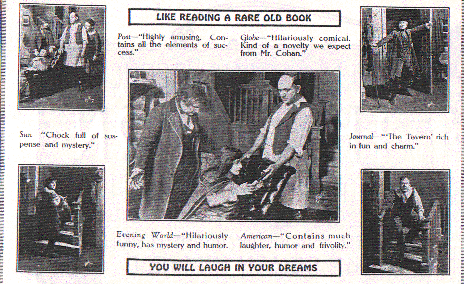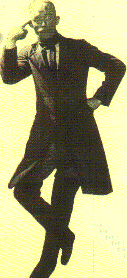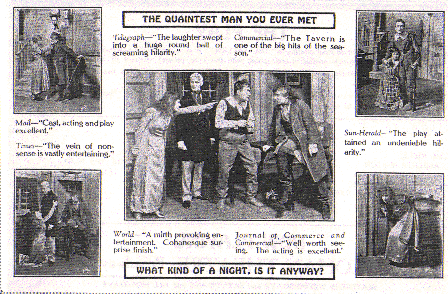George M. Cohan In America's Theater | home
Stageography | What's New | George Washington, Jr. | The Merry Malones | Broadway Jones | 45 Minutes From Broadway | About Me | The Little Millionaire | Little Nellie Kelly | The Tavern | Seven Keys To Baldpate | Ah, Wilderness! | Get Rich Quick Wallingford | The Royal Vagabond | Discography & Filmography | Early years: 1878-1900 | Broadway Rise: 1900-1909 | Broadway Emperor: 1910-1919 | Decline & Fall: 1920-1929 | Little Johnny Jones | I'd Rather Be Right | Broadway Legend: 1930-1978 | Mailbag/Contact Me | Related Links | Articles & Thoughts | The Yankee Prince
Opened: September 27, 1920
Cohan Theater, NYC

Flyer for the original production of "The Tavern"
Original Cast:
The Tavern Keeper............................Dodson Mitchell
The Tavern Keeper's Son.................Phillips Tead
The Hired Girl....................................Wanda Carlyle
The Hired Man...................................Spencer Charters
The Vagabond...................................Arnold Daly
The Woman........................................Elsie Rizer
The Governor......................................Morgan Wallace
The Governor's Wife..........................Lucia Moore
The Governor's Daughter..................Alberta Burton
The Fiancee.......................................William Jeffery
The Sheriff..........................................Lee Sterrett
Synopsis:
On a stormy night, a mysterious wanderer enters the lives of a small
group of people. During the course of the evening a murder occurs,
and each of the group of people attempt to solve it.
Critic's Corner:
"There can no longer be any doubt that George M. Cohan is the greatest
man in the world. Anyone who can write "The Tavern" and produce it as
"The Tavern" is produced places himself automatically in the class with
the gods who sit on Olympus and emit Jovian (or is it Shavian) laughter
at the tiny tots below on earth. In fact, George M. Cohan's laughter is
much more intelligent than that of any god I ever heard of...
Every line and situation in it can be either serious or burlesque, according
to the individual powers of discernment of the listener. In the second act
even the most naive of the newspaper writers felt the force of the
burlesque and commented on it indulgently."
"The only gesture on hearing these comments is to raise clenched fists
to the sky, and the only reply is to shriek through the teeth. Of course
Arnold Daly would not be young enough for the part if it were a serious
part, but for the part of a mature madman who thinks he is Francois
Villon, there is probably no one in the world (one has to be extravagant
in speaking of "The Tavern;" it is an extravagant event) - there is no
one in the world who could have brought the delightful and subtle
burlesque romanticism into the play that Arnold Daly brings. Of course he
was injudiciously dressed. No two characters in the play were of exactly
the same period.
...the biggest night in (my) theatergoing career, for it marked the birth
of something new on the stage, a gorgeous insanity from which it is to be
hoped the drama as an institution will never recover. And if George M.
Cohan will run for President, this department will be dedicated to his
service."
Robert Benchly - Life Magazine - 1920
"There is nothing left but to mutter sullenly that one may not know anything
about art, but one knows what is perfectly great...an evening to look back
on for the remainder of a lifetime. One, or at least, this one, which is what
is usually meant by the person employing the word - has long dreamed
non-Freudian dreams of a burlesque, built of a situation and speeches
from all the particularly hair-raising productions that have gone before;
Mr. Cohan has built his burlesque of these and has done immeasurably
more by adding those mastering touches which no other living playwright
could add..."
"No there is no use trying to report it. The typewriter's touch is too heavy.
All one can do is to throw awe of the newspapers recklessly aside, and
proclaim that here is an entertainment sent from heaven, via Mr. Cohan.
See it for yourself. See the whole company...show how to take a joke.
And if "The Tavern" is not running by the time this comes out, write to
your congressman and demand its immediate revival."
Dorothy Parker, Ainslee's Magazine, December 1920
Cohan's Recollection:
To Arnold Daly after reading a positive review of "The Tavern" :
"I had no idea that's what I did. I guess I'm minor league Shaw now, Arnold."
On Arnold Daly:
"He came to me and said, 'George when do we have a change of bill?'
"What do you mean - a change of bill? This show will run a year longer,'
I countered. 'Not with me in it, I'm through now,' he replied. 'Don't be
silly,' I argued, 'if it's a raise you're looking for, we're friends - spout it out.'
'I'm fed up with the part. I'm going to play Ibsen and Shaw at Wednesday
matinees at the Comedy Theater,' he replied."
"And he did poor Arnold - just before he was burned to death (1927), he
telephoned me for $500. I knew he was drinking so I sent him $250. The
messenger hardly had time to reach him when the telephone rang. It was
Daly.
" 'Thanks for the cash, George,' he said. 'But you forgot something.' 'What
was that?' I asked. 'The IOU for the other 250,' he said."
_______________________________
" 'Somebody stop this man,' the literary ladies and gentlemen again demanded.
The bold, bad band of dramatic critics drew forth their sharpened pencils and
stabbed me to the heart.
'What's it all about?'
'Where's the plot?'
'What's the idea?'
"What's all this business for?' they cried, as they watched the crowds piling into
the Cohan Theater.
'What's all the shootin' for?' the low comedian of the play would shout back at
them during each performance.
The public flocked to "The Tavern," and to this day I still believe it was sheer
curiosity that brought the crowds to see for themselves whether or not any play
could possibly be as bad as the New York critics had declared this one.
A second company, organized and sent to Chicago, duplicated the New York
hit, and before the season ended, "The Tavern" was the most widely discussed
and best advertised play in America."

Cohan as
The Vagabond in
1921
Notes:
"The Tavern" was George M.'s favorite play, and he revived it many times
(most notably the 1921 and 1930 productions) portraying the Vagabond
himself. In 1940 he wrote a sequel "The Return Of The Vagabond" that
featured himself once again, and Broadway newcomer: Celeste Holm.
It lasted only seven performances. It was the character of the Vagabond that
inspired Cohan through out the succeeding decades. Most notably the
character of Parker, and the mystery that surrounds his identity, in "Pigeons &
People" (1933).
Based on Cora Dick Gantt's play "The Choice Of A Super-Man," it
brought Cohan out of another self-imposed retirement after his struggle
with Actor's Equity. The character of Vagabond reflected Cohan's growing
contempt of the profession that he dominated for so long (now a social
outcast from most of his peers, in search of his lost self).
Arnold Daly's biggest contribution to the theater was his responsibility
for bringing the works of George Bernard Shaw to America. He starred
in the original American productions of "Candida," and "Man & Superman"
in 1905. Casting him as the Vagabond "The Tavern" was a perfect choice,
as attested by the Benchley review above. A year later, Daly tired of the
role, and was replaced by Cohan.
In 1962 a revival production featuring George Grizzard scored a minor hit.

Flyer for the original production of "The Tavern"